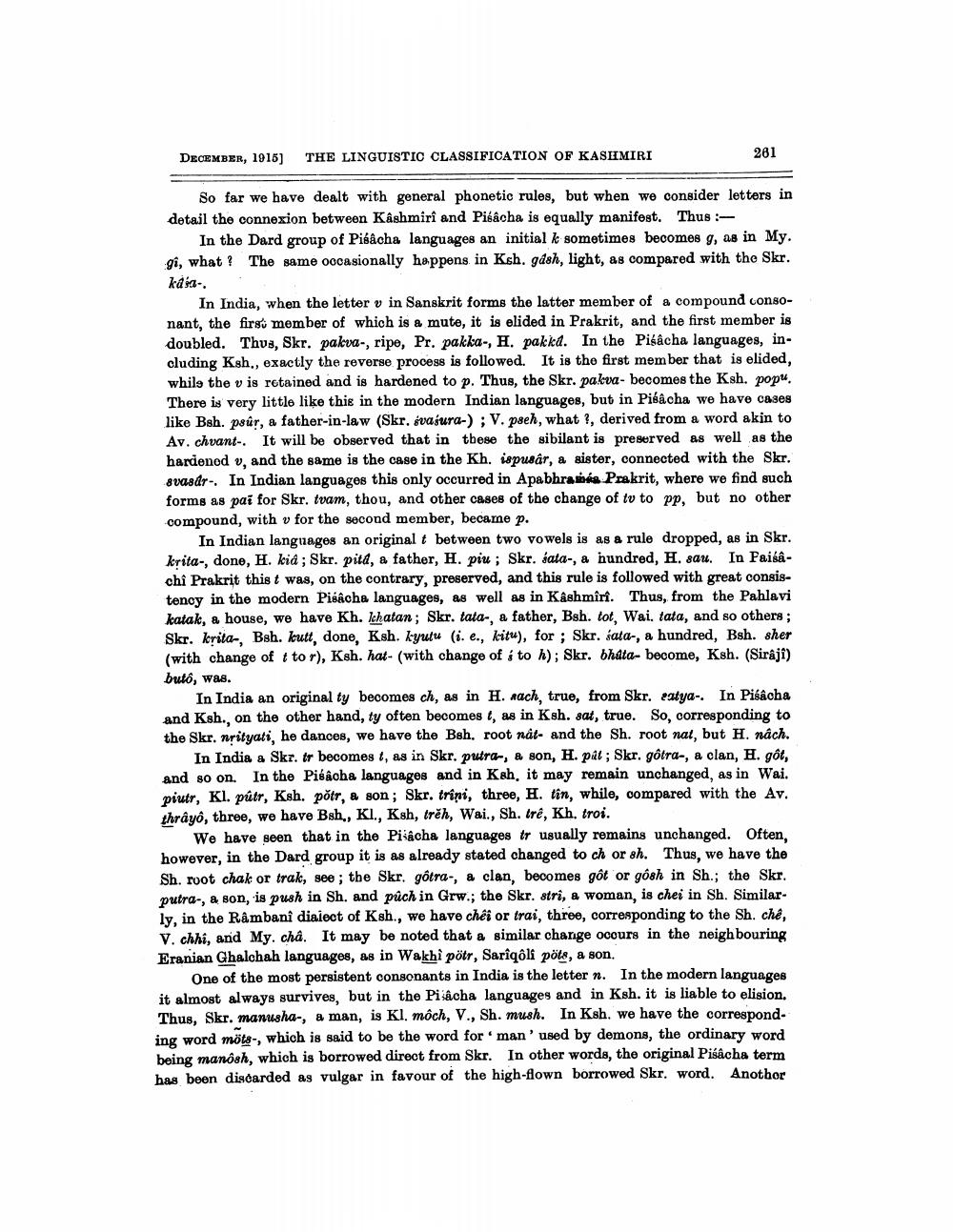________________
DECEMBXR, 1918)
THE LINGUISTIC CLASSIFICATION OF KASHMIRI
281
So far we have dealt with general phonetic rules, but when we consider letters in detail the connexion between Kashmiri and Pisacha is equally manifest. Thus :
In the Dard group of Pibâcha languages an initial k sometimes becomes y, as in My. gi, what? The same occasionally happens in Ksh. gdsh, light, as compared with the Skr. kdra.
In India, when the letter v in Sanskrit forms the latter member of a compound consonant, the firsu member of which is a mute, it is elided in Prakrit, and the first member is doubled. Thus, Skr. pakva-, ripe, Pr. pakka-, H. pakkd. In the Pisacha languages, including Ksh., exactly the reverse process is followed. It is the first member that is elided, while the vis retained and is hardened to p. Thus, the Skr. pakva- becomes the Ksh. popu. There is very little like this in the modern Indian languages, but in Piśâcha we have cases like Bsh. psûr, a father-in-law (Skr. svašura-) ; V. pseh, what?, derived from a word akin to Av. chvant-. It will be observed that in these the sibilant is preserved as well as the hardenod v, and the same is the case in the Kh. ispusar, a sister, connected with the Skr. svasdr. In Indian languages this only occurred in Apabhra Prakrit, where we find such forms as pai for Skr, tvam, thou, and other cases of the change of tv to pp, but no other compound, with v for the second member, became p.
In Indian languages an original t between two vowels is as a rule dropped, as in Skr. krita-, dono, H. kid; Skr. pita, a father, H. piu ; Skr. kata-, a hundred, H. san. In Faibachi Prakrit this t was, on the contrary, preserved, and this rule is followed with great consistency in the modern Pisacha languages, as well as in Kashmiri. Thus, from the Pahlavi katak, a house, we have Kh. Ichatan; Skr. tata-, a father, Bsh. tot, Wai, tata, and so others; Skr. krita- Beh. kutt, done, Ksh. kyutu (i. e., kitu), for ; Skr. kata-, a hundred, Bsh. sher (with change of tor), Ksh. hat. (with change of i to h); Skr. bhdta- booome, Ksh. (Siraji) butô, was.
In India an original ty becomes ch, as in H. Aach, true, from Skr, eatya-. In Pisacha and Ksh., on the other hand, ty often becomes t, as in Ksh. sat, true. So, corresponding to the Skr, nrityati, he dances, we have the Bsh, root nåt- and the Sh. root nat, but H. nách.
In India a Skr. tr becomes t, as in Skr. putra, a son, H. pit; Skr. gôtra-, a clan, H. gôt, and so on. In the Pisacha languages and in Ksh, it may remain unchanged, as in Wai. piutr, Kl. pútr, Ksh. põtr, a son; Skr. trini, three, H. tin, while, compared with the Av. thrâyó, three, we have Bsh., KI., Ksh, treh, Wai., Sh. Irë, Kh, troi.
We have seen that in the Pijâcha languages ir usually remains unchanged. Often. however, in the Dard group it is as already stated changed to ch or sh. Thus, we have the Sh. root chak or trak, see; the Skr. gôtra-, a clan, becomes gôt or gôsh in Sh.; the Skr. putra-, a son, is push in Sh. and půch in Grw.; the Skr. stri, a woman, is chei in Sh. Similarly, in the Rambanî dialect of Ksh., we have chei or trai, three, corresponding to the Sh. ché, V. chhi, and My. chå. It may be noted that a similar change ocours in the neighbouring Eranian Ghalohah languages, as in Wakhi pötr, Sariqôli pols, a son.
One of the most persistent consonants in India is the letter n. In the modern languages it almost always survives, but in the Piâcha languages and in Ksh. it is liable to elision. Thus, Skr. manusha-, a man, is Kl, môch, V., Sh. mush. In Ksh. we have the correspond. ing word möts-, which is said to be the word for man' used by demons, the ordinary word being manôsh, which is borrowed direct from Skr. In other words, the original Pisacha term has been discarded as vulgar in favour of the high-flown borrowed Skr. word. Another




